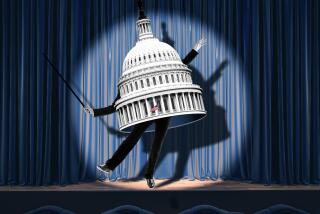An Exhibition of Unintended Barriers : Restrictions on foreign artists cause more problems than they solve
New barriers to foreign artists? Let’s hope not, but little-noticed provisions in the Immigration Act of 1990, which Congress passed last fall, are creating an uproar in the arts and entertainment community.
Controversial new visa requirements for foreign performers could significantly restrict and complicate the U.S. appearances of artists, entertainers and even athletes. These regulations must be revised.
The new law, for the first time, puts specific requirements on such performers, categorized as “temporary non-immigrant workers.” The Immigration and Naturalization Service recently proposed a set of regulations outlining new visa clearance procedures.
The proposals, open to public comment, would mostly affect foreign performers who appear in groups such as rock bands, ballet companies, dance troupes, opera companies and symphonies.
U.S. artists and entertainers fear that the INS-proposed rules, if strictly enforced, could trigger retaliatory action against American performers by other countries.
The rules would also create problems in booking foreign groups’ tours, typically done years before a scheduled performance. This would achieve little in promoting cultural and entertainment exchanges.
The INS proposals, among other things, would limit the number of group performers allowed to enter the United States in any one year to 25,000; visas would be restricted to individuals who had worked with a group for at least one year, and U.S. sponsors could not apply for visas until 90 days before a booking. The INS would consult with unions before granting any temporary work visas, and performers in groups would have to demonstrate fame and prominence to qualify for visas.
Sens. Edward M. Kennedy (D-Mass.), Alan K. Simpson (R-Wyo.) and Paul Simon (D-Ill.) are trying to modify these provisions. In a letter to the INS, they said that in the final markup of last year’s immigration bill the true effect of the visa policies on the arts was not made clear. That’s because at a late date the House put in provisions to answer union concerns that temporary performers and especially support personnel may be displacing U.S. workers.
Congress is smarting because many specifics of the proposed rules were defined by the INS, not by statute. The agency’s interpretation is clearly questionable; the controversy and volley of objections by artists in the United States raise serious questions. The INS needs to take a second look at its proposals and come up with revised visa requirements that are more practical, realistic and doable.
More to Read
The biggest entertainment stories
Get our big stories about Hollywood, film, television, music, arts, culture and more right in your inbox as soon as they publish.
You may occasionally receive promotional content from the Los Angeles Times.










